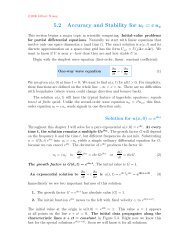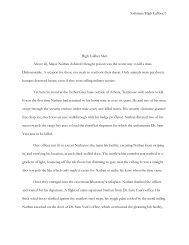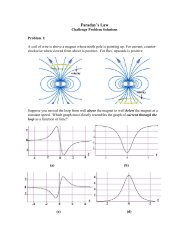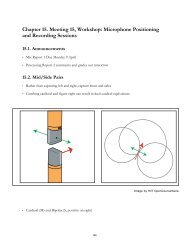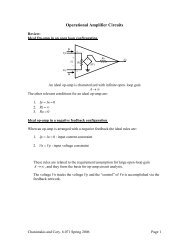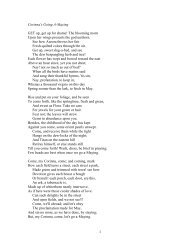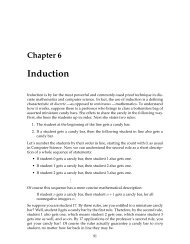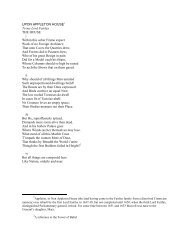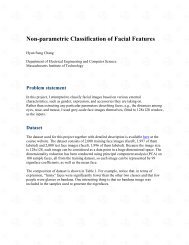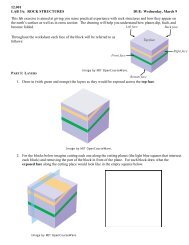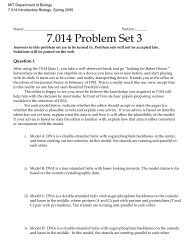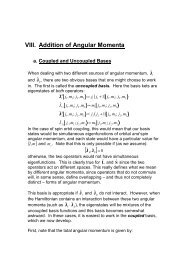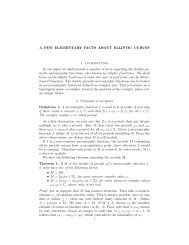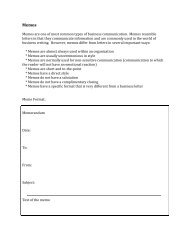MAS.632 Conversational Computer Systems - MIT OpenCourseWare
MAS.632 Conversational Computer Systems - MIT OpenCourseWare
MAS.632 Conversational Computer Systems - MIT OpenCourseWare
You also want an ePaper? Increase the reach of your titles
YUMPU automatically turns print PDFs into web optimized ePapers that Google loves.
Higher Levels of inguiti Knowledge<br />
how it relates to the world and objects in it; the sentence stands for some concept<br />
or real entity. Meaning is what differentiates nonsense utterances of arbitrary<br />
words from rational sentences, and much of the study of semantics is devoted to<br />
representations of knowledge about the world.<br />
Semantics begins with meaning at the lexical level; we cannot understand a<br />
sentence unless we know the meaning of each word in the sentence. Further,<br />
most words have multiple meanings or senses, and we must choose among these<br />
senses to understand the sentence as a whole. For example, "green" when used as<br />
an adjective usually denotes color ("green leaves") but also has another sense in<br />
which it means novice or naive ("a green first baseman"). These two senses may<br />
be differentiated by considering the noun that "green" modifies. Experience is a<br />
concept applied to sentient beings not plants so the sense of "novice" is appropriate<br />
only when green modifies a noun that corresponds to a person. One word in a<br />
sentence may constrain the interpretation of other words in the sentence. Note<br />
the interplay between syntax and semantics: syntax reveals that "green" is used<br />
as an adjective and indicates which noun "green" modifies, from which we can<br />
then determine the sense in which "green" is being used.<br />
The intended senses ofwords in a phrase or sentence are mutually constrained;<br />
this is called selectional restriction. Our knowledge of the attributes of objects<br />
in the world helps us identify the sense in which a word is being used to describe<br />
an object as we did in the example in the previous paragraph. In addition to<br />
objects, i.e., noun phrases, we also apply knowledge about how objects interact,<br />
i.e., verb phrases, while selecting word sense.<br />
Case grammar attempts to enumerate the cases, or roles, a noun phrase can<br />
take with respect to a verb. One case is AGENT; the agent is the instigator of an<br />
action and is usually the subject of a sentence. The object acted upon, often<br />
identified as the object of the sentence, is a case called THEME. In the sentence<br />
"John smashed up the car," John is the agent and the car is the theme. Cases<br />
such as AT, TO, and FROM indicate location. An animate object for which an action<br />
is performed is the BENEFICIARY, while an animate object in a mental state is the<br />
EXPERIENCER. The number of cases is extensive because noun phrases can be<br />
used in many different relationships to verbs. Just as real-world knowledge<br />
helps establish the meaning of noun phrases, case grammar provides a representation<br />
of meaning derived from the roles of noun phrases in an action or<br />
state of being.<br />
From this very brief discussion it should be apparent that we obtain cues for<br />
the cases of noun phrases from their position in a sentence. For example, subjects,<br />
or AGENTS, precede objects, or THEMES, in an active voice sentence, but this<br />
order is reversed for passive voice. Prepositions are particularly strong cues for<br />
the location cases (AT, TO, and FROM). Selection of cases is controlled by verbs in<br />
other ways as well. The verb "move," for example, has a strong requirement for a<br />
TO location case to complete its usual meaning as in "we moved to Wyoming." For<br />
other sentences a different case is appropriate; an EXPERIENCER completes the<br />
sentence "Her singing moved the audience." The concept of case conveys some<br />
aspects of the meaning of noun phrases in a sentence, but in the case of a noun<br />
phrase it also depends on the meaning of the verb with which it is associated. The<br />
187



